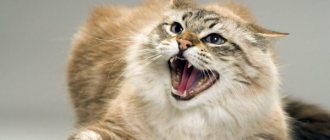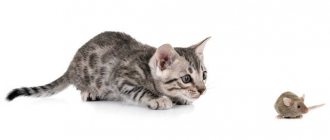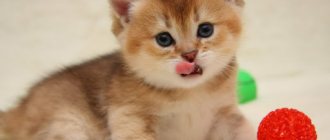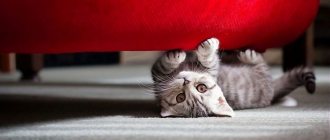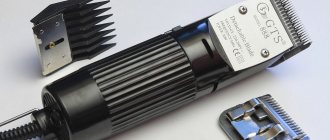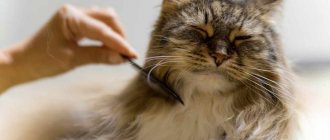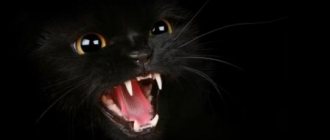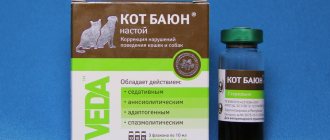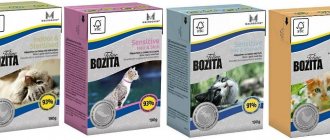Domestic cats are self-sufficient and proud creatures with a very vulnerable nature. In special situations, they need sedatives so that cats do not experience severe stress and remain calm and balanced. Before giving a sedative, you need to figure out which one will be the most effective and, most importantly, safe.
When to calm your cat
Cats can fall into long-term depression and experience severe anxiety due to any atypical life situation. For example, a pet may be scared by:
- long trip;
- visiting a grooming specialist;
- change of owner;
- appointment with a veterinarian;
- healing procedures;
- exhibition;
- arrival of guests with small children;
- moving to a new apartment.
Often cats feel aggression and overexcitement if a new pet appears in the house. Psychogenic disorders occur during sexual arousal and after childbirth. The latter are associated with the fear of losing kittens. To get out of problematic situations with minimal negative consequences for the animal and owners, you need to know exactly which sedative for cats to choose. In some situations, a mild sedative based on beneficial herbs is enough, in others you will have to seek help from a veterinarian who will prescribe serious chemical tablets or even tranquilizers.
In what cases is sleeping pills used for cats?
Sleeping pills for cats are used in cases where it is necessary to ensure the immobility of animals. Most often, this need arises in the following situations:
- when visiting a veterinary clinic: many tests, hardware examinations, preparation for and the conduct of surgical operations themselves require the cat to remain immobile for a long time;
- grooming – the need to use sleeping pills increases with difficult hair cuttings;
- the postoperative period, during which the cat needs complete rest;
- when moving and transporting a pet on a train or plane;
- suffered stress, during which the animal becomes agitated, hyperactive and even aggressive.
Attention! Sleeping pills have a strong effect on the cat's body, so using it without consulting a veterinarian is dangerous - it can be fatal.
Symptoms of Excessive Anxiety
Cat behavior problems aren't just related to travel or grooming. Often the animal begins to behave abnormally. This appears as:
- frequent licking of fur and marking territory;
- aggression towards members of the household or towards oneself;
- unmotivated jumping;
- obsessive movements of the tail, paws or head;
- constant meowing;
- pulling out fur or sucking on tissue;
- fixed gaze;
- gluttony followed by vomiting;
- hunting for non-existent prey.
Of course, such symptoms may indicate not only psychological stress, but also the onset of a physical illness. Such situations should be handled by an experienced veterinarian. He will conduct an examination and prescribe a high-quality and safe sedative for cats under stress.
When you might need a sedative
global $ads_google;
//data-ad-slot=”2475549904″ $ads_google = empty($ads_google) ? false : true; ?> if ($ads_google == false) {?> $ads_google = true; ?> } ?> A sedative should not be used without good reason. If there is a chance to calm the cat in another way, it is better not to resort to drug intervention, even one based on a phytotherapeutic effect. The stress that the cat experiences from the arrival of guests could be neutralized by purchasing a soft house, in the niche of which the animal will feel protected. You can make such a house with your own hands.
In the cases described below, you may actually need the help of sedatives.
Mental disorders
Outwardly, such violations manifest themselves in endless licking of the fur, which can even lead to its thinning. The skin under the fur looks irritated from constant contact with saliva and tongue. In addition, the cat may hunt for a non-existent target, twitch and jump for no reason, and constantly meow unmotivated.
Transporting a pet
During transportation, especially when the cat is not accustomed to this from early childhood, the animal may become stressed. If in a car the problem comes down only to a new way of moving, then public transport can easily cause panic in the cat. You will have to focus on your pet; there are also those who are just happy to go for a ride.
If the standard behavior changes, it will have to be corrected with medication. When planning a move, it is better to give your pet medicine in advance, especially if the instructions for the sedative drug say that it has a cumulative effect. It is better to learn in advance how to properly transport cats in a carrier.
Stress
Stress occurs for a number of reasons, including part of mental disorders and the circumstances of the pet’s living conditions. In many cases, it is better to consult a specialist and find the cause of the stressful condition. Probably, if you eliminate it, you won’t need to take medications.
Grooming
Grooming is highly valued by owners, but animals are not always as happy as visiting exhibitions. If large-scale procedures are planned, you can treat the cat with sedatives.
Castration
Castration and sterilization, as a surgical intervention in the body, also cause the cat to experience serious stress, both on the physical and mental level.
global $ads_google; //data-ad-slot=”2475549904″ $ads_google = empty($ads_google) ? false : true; ?> if ($ads_google == false) {?>
$ads_google = true; ?> } ?>
Aggression
Fear, anxiety, and phobia can result in aggressive behavior. Aggression that is not typical behavior must be corrected.
Estrus
Against the background of estrus, aggression and hypersexuality may also occur, which can be very difficult to tolerate. Activation of the sexual instinct affects the well-being of pets, sometimes causing them to actually suffer.
Homeopathic sedatives
There are many harmless tablets and drops on a natural basis. The best sedatives for cats are:
- Fospasim is a complex in the form of injections with a powerful anti-stress effect. Relieves fearfulness and aggressiveness, helps the animal quickly adapt to a new environment.
- Calm Aid is a sedative chewable tablet that tastes like beef. They include organic amino acids that give a feeling of comfort, relieve anxiety and nervous tension.
- Zylken - capsules with tryptic hydrolyzate of casein. It is obtained from cow's milk. The natural compound calms the cat's nerves without side effects.
- Fitex - Russian sedative drops based on plant extracts. Reduces excitability before a planned event.
- Bach drops are a homeopathic concentrate with herbal ingredients. It helps solve emotional and behavioral problems.
- Kot Bayun - water infusion or tablets with extracts of beneficial plants. The product relieves fear and has an antispasmodic and sedative effect.
- Stop-stress is a drug for pets, produced in the form of drops and tablets. In addition to plant compounds, it contains phenibut, which relieves anxiety and fears.
The above sedatives are sold in almost any veterinary pharmacy. They work great when transporting, brushing teeth, bathing, during haircuts or when moving to a new home.
Not every pet, especially if it is already showing increased aggressiveness or fearfulness, will agree to swallow a calming concentrate or tablet. If there is no trust and close contact with the owner, it is better to use a special fumigator Feliway. It belongs to the group of safe products that provide a feeling of security and peace. And the owner himself won’t have to rack his brain for a long time on how to give a sedative to a cat that is hiding and scratching before a haircut or vaccination. Feliway is also available in spray form.
Mr. Cat recommends: principle of operation
There are two types of sedatives for cats:
- Soft herbal homeopathic preparations of prolonged action. They contain extracts of soothing herbs. They carefully relieve tension from the nervous system and act cumulatively, that is, they achieve the greatest effect after a few days of regular use.
- Medicines in tablets and injections that act instantly, but at the same time have a number of side effects and are not always safe.
The use of chemicals is a last resort when the benefit outweighs the potential risk to the cat's health.
Types of sleeping pills
Hormonal sedatives
Very often, sexually mature cats and female cats become very anxious due to sexual desire. In such situations, the use of sedatives is completely justified. To suppress hypersexuality and nervousness, drugs with sex hormones are indicated:
- Cowinan.
- Antisex.
- Sex Barrier.
- Gestrenol.
Important! Regular natural soothing drops for adult cats that experience a hormonal explosion during sexual activity will be ineffective. To prevent your pet from showing aggression, rolling on the floor, or meowing loudly, veterinarians recommend the above-mentioned hormonal contraceptives. They remove external signs of sexual desire, suppress excessive desire, prevent pregnancy and interrupt estrus.
You can now see the current price of sedatives for cats and buy them right here from Yandex Market with fast delivery:
Animal behavior after using sleeping pills
The cat's behavior depends on which drug is chosen for administration. They are divided into groups according to the duration of the effect:
- short-term - after taking them, the cat may not fall asleep, but the body will be completely immobilized, the animal will allow any manipulation with itself;
- medium-term – the cat completely relaxes (both the muscles and the nervous system), while the animal does not feel pain;
- long-term – also has an analgesic effect, the cat is relaxed and will sleep for 8-10 hours.
Important! After sleeping pills, the cat will come to its senses throughout the day. If the animal’s condition has not returned to normal during this time, you should contact a veterinarian.
It is quite difficult to name specific breeds of cats that do not tolerate the effects of sleeping pills well. Veterinarians say that a cat’s condition does not depend on the breed, but on its condition before the administration of sleeping pills. For example, the drug is not recommended for use by pregnant or lactating cats, as well as kittens under 6 months.
How do cat sedatives work?
Natural sedatives for cats can be given at home. They have a prolonged effect, reduce tension, and have a beneficial effect on the animal’s nerves. They are poured or added to food in advance, that is, an hour or two before transportation.
Injections, tablets and drops with chemical ingredients act faster and stronger. To prevent them from causing harm, it is necessary to strictly adhere to the frequency of administration and dosage recommended by the veterinarian.
Many cat breeders mistakenly believe that to relieve stress in a cat, it is enough to give him an infusion of valerian. This is not true. The plant component excites even more, even causes hallucinations, and increases sexual desire. A strong addiction develops to it, even from the first use. In case of overdose, epileptic seizures sometimes occur. The same goes for catnip. Its essential oil tones the pet too much, adds aggressiveness and harms the body.
How often can you give your cat sleeping pills?
The use of sleeping pills for a cat’s body does not go unnoticed. Therefore, this group of drugs should be used only in extreme cases and as rarely as possible. Before using sleeping pills, the cat should not be fed for 24 hours.
You can also administer sleeping pills yourself. But this can only be done after the veterinarian prescribes the dosage and shows how to administer the medicine correctly.
Under no circumstances should you prescribe the type of medication and its dosage yourself - this can lead to death.
How to give sedatives correctly
Light sedatives for cats put the nervous system in order. If more serious mental disorders are noticed in an animal, consultation with a specialist cannot be avoided. You should not administer chemical tranquilizers yourself. Moreover, increase the dosage.
Attention! If the cat is excessively sleepy, begins to vomit, or has lost coordination of movements, it is better to immediately go to the veterinary clinic for gastric lavage.
Many potent tranquilizers are addictive. They disrupt the functioning of the central nervous system, the cardiovascular system, and cause general intoxication. They turn a once active and cheerful cat into an apathetic and inhibited creature. Before starting home therapy, you should definitely consult a specialist. Sometimes an aggressive pet simply does not have enough affection and attention, and he is fed neuroleptics, antidepressants and sedatives.
Mechanism of action
Experts divide sedatives for cats into 2 types: homeopathic and chemical. Regardless of the principle of action of the product, its effect is aimed at:
- pressure correction;
- beneficial effect on the nervous system;
- suppression of feelings of fear;
- Relieving tension.
Special collars with pheromones
Not all domestic cats tolerate homeopathic remedies with sedative effects. They develop allergies and other side effects. A unique calming collar was created for such furry pets. It is suitable for cats of different ages, it is similar to a regular anti-parasitic accessory, but it emits a specific smell around itself.
A sedative collar should not be worn on a cat every day, but only when necessary. It has a positive effect on overly emotional and temperamental animals and does not harm their health. They behave calmly during medical events, exhibitions, and long trips. Sometimes owners use a calming accessory if they plan to have guests, fly on an airplane, or have a new pet in the house. It is impossible to get an overdose of natural pheromones, so collars are considered the safest means for pets.
Contraindications and harm
Sedative medications have contraindications, which are important to familiarize yourself with before giving it to your cat . Most sedative medications should not be given to your pet in the following cases:
- low blood pressure;
- pregnancy;
- the onset of lactation;
- presence of diabetes mellitus or a history of urolithiasis;
- individual intolerance to the components of the medication.
You should not give sedatives to young animals whose age has not reached 12 months.
It is difficult to say unequivocally regarding the harm caused to the cat’s body. There are no absolutely safe medicines. It is impossible to predict exactly how the body of a particular cat will react to the components of the drug.
Note! Long-term use of sedative tablets can cause addiction, inhibition of reaction and apathy in a pet.
Causes
It is impossible to make an accurate diagnosis and find out how to treat a runny nose in a cat without appropriate education and experience. However, if you look closely at the condition of the animal, you can determine the type of disease.
- Colds due to hypothermia, for example after swimming. Green discharge from both nostrils.
- Infection (viral, bacterial). You can catch the disease from another pet. The snot is thick and cloudy. Cats often have watery eyes.
- Infection (fungal). The disease is often chronic, and the cat has a runny nose mixed with pus and an unpleasant odor.
- Trauma, including the presence of foreign bodies in the nasopharynx. The mucus is mixed with blood, but flows out of only one nostril.
- Pathology of teeth and gums. Purulent rhinitis is observed. It can be one-sided or two-sided, this is due to where the abscesses have formed.
This is an incomplete list of reasons. The discharge may be caused by allergies, high blood pressure, or breed characteristics such as a short muzzle.
Owners do not always begin treatment for runny nose in cats immediately. If it is a common cold and there is little discharge, then you can postpone going to the veterinarian. However, if after a week the patient does not feel better, and the mucus interferes with breathing, it is worth taking action.
Tips for using sedatives
Sedatives for cats are only a method of eliminating the consequences, not the cause. So they are not a panacea for cases such as aggression towards new animals in the house, or fear of the unknown (your guests). In such cases, you should try to re-educate your pet. And finally, a few tips:
- Do not under any circumstances overuse sedatives for cats, because in some cases this can lead not only to the animal becoming addicted to the drug, but also cause health problems;
- If, after being sedated, the animal begins to vomit, become excessively drowsy, or have another undesirable effect, the cat’s body has reacted atypically to one of the components of the drug, so it is better to consult a veterinarian before choosing the next drug.
Contraindications for taking sleeping pills
As with any medical product, the use of sedatives should be discussed with your physician. He is the one who can tell whether there are contraindications and whether the remedy is necessary. A specialist’s opinion should be sought if the animal has recently undergone surgery or suffers from allergies.
You should not give sleeping pills to pregnant pets or abuse them unless absolutely necessary. In large doses, the medicine will become poisonous, and with prolonged use it will become addictive and contribute to health problems.
With individual intolerance, the kitten experiences diarrhea, vomiting, drowsiness, refusal to eat, and unusual behavior. In this case, the medication is stopped and the pet is sent to the doctor.
Composition and properties of the drug
Stop-stress for cats is a combined sedative drug produced in Russia. It is available in two dosage forms - drops and tablets.
Stop stress Plus drops
The drug is a viscous liquid from pale yellow to yellow in color, in which opalescence is possible. The composition of Stop Stress drops for cats includes:
- L-theanine – 45-55 mg/ml;
- tryptophan – 9-11 mg/ml;
- glycine – 90-110 mg/ml.
The drug contains as excipients:
- polyvinylpyrrolidone – 54-66 mg/ml;
- aspasvit C 200 – 4.5-5.5 mg/ml;
- potassium sorbate – 1.35-1.65 mg/ml;
- citric acid – 1.35-1.65 mg/ml;
- sodium benzoate – 1.35-1.65 mg/ml;
- purified water – up to 1 ml.
Stop-stress Plus drops are packaged in dropper bottles of 10 and 15 ml or polymer bottles sealed with screw caps with tamper-evident control of 30 and 50 ml. Containers must be labeled and packaged in separate cardboard boxes complete with instructions and a dispenser syringe.
Drops are stored separately from feed and food in a dry, dark place, out of reach of children, at a temperature of 0-25 ° C. If all conditions are met, the shelf life of the sealed drug is 2 years from the date of manufacture. An opened bottle must be used within 30 days.
Stop stress pills
Stop stress tablets are produced in two modifications:
- Stop stress tablets-2 weighing 200 mg. Each contains 100 mg of phenibut and 10 mg of skullcap extract, hop extract, motherwort extract and peony extract.
- Stop-stress tablets-5 weighing 500 mg. Each contains 250 mg of phenibut and 30 mg of skullcap extract, hop extract, motherwort extract and peony extract.
The tablets also contain lactose, cyclamate, saccharin, aspartame, carboxymethylcellulose and calcium stearate.
Important! Stop-stress tablets-5 are intended for large dogs.
The drug is available in blister and cellless packaging, as well as glass or polymer jars with screw caps. Outline packages and cans are placed in cardboard boxes complete with instructions.
The tablets are stored away from feed and food in a dry, dark place, out of reach of children, at a temperature of 0-25 °C. If the recommended conditions are met, the shelf life of the drug is 2 years from the date of release.
